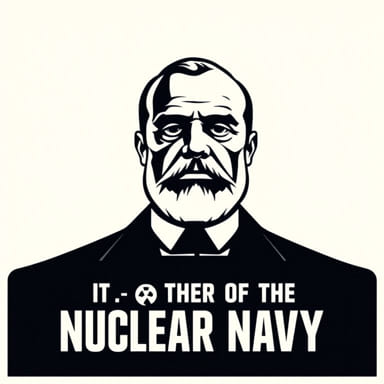In the annals of military and technological history, few figures stand as prominently as Admiral Hyman G. Rickover, often known as the Father of the Nuclear Navy. His vision, determination, and commitment to excellence revolutionized naval propulsion and reshaped the U.S. Navy into a dominant force in the Cold War era and beyond. Rickover’s legacy goes far beyond engineering; his leadership, values, and insistence on responsibility have left an enduring mark on American defense policy, education, and nuclear safety.
Early Life and Naval Career
Hyman George Rickover was born on January 27, 1900, in Maków Mazowiecki, Poland, and immigrated to the United States with his family at a young age. Growing up in Chicago, he displayed a strong aptitude for academics and discipline. He earned an appointment to the U.S. Naval Academy at Annapolis, graduating in 1922. Although his early career in the Navy followed a traditional path, Rickover’s interests quickly turned toward engineering and technological advancement.
After completing postgraduate work in electrical engineering at Columbia University and training at the Naval Postgraduate School, Rickover joined the Bureau of Engineering. His work there laid the foundation for what would become his most significant contribution: the application of nuclear energy for naval propulsion.
The Advent of Nuclear Propulsion
In the wake of World War II, as the United States explored the civilian and military uses of atomic energy, Rickover saw the potential for nuclear technology in submarines. He believed nuclear propulsion could eliminate the limitations of conventional diesel-electric submarines, which had to surface frequently to recharge their batteries, exposing them to enemy detection.
By the late 1940s, Rickover was assigned to the U.S. Atomic Energy Commission. From this position, he spearheaded the Naval Reactors Branch, working relentlessly to develop and implement nuclear power for military use. His leadership culminated in the successful launch of the USS Nautilus in 1954, the world’s first operational nuclear-powered submarine. The Nautilus could remain submerged for extended periods, marking a revolutionary shift in submarine warfare and strategy.
Why Rickover Was Called the Father of the Nuclear Navy
- Visionary Leadership: Rickover foresaw the strategic benefits of nuclear propulsion when others remained skeptical.
- Technical Expertise: His engineering knowledge and deep involvement in reactor design ensured safety and reliability.
- Unwavering Standards: He demanded absolute excellence in training, construction, and operation.
- Long-Term Impact: Rickover’s nuclear navy became a critical deterrent during the Cold War, laying the groundwork for modern nuclear-powered fleets.
Rickover’s Leadership and Philosophy
Rickover’s leadership style was legendary and often controversial. He was known for his directness, discipline, and intolerance for incompetence. He personally interviewed and approved every officer selected to command a nuclear-powered vessel, a process that instilled accountability and ensured only the best served under his command.
Rickover’s philosophy emphasized integrity, responsibility, and technical competence. He believed in attention to detail and the necessity of understanding systems thoroughly, not merely managing them from a distance. These principles were embedded into the culture of the nuclear Navy and contributed to its unmatched safety record.
Impact on Nuclear Safety and Training
One of Rickover’s most lasting contributions was the rigorous safety standards and training programs he implemented. Unlike civilian nuclear programs, Rickover’s system focused on prevention, redundant safety mechanisms, and individual accountability. The success of this approach is evident: in more than 60 years of operation, the U.S. Navy’s nuclear-powered vessels have not experienced a single reactor accident involving radiation release.
Expansion of the Nuclear Fleet
Following the USS Nautilus, the Navy rapidly expanded its nuclear-powered fleet. Submarines, cruisers, and aircraft carriers were equipped with nuclear reactors, dramatically increasing their range, endurance, and combat capability. By the 1960s and 1970s, nuclear-powered submarines became essential to the U.S. nuclear triad, providing second-strike capabilities in the event of nuclear war.
Rickover remained in charge of the Naval Reactors program until his retirement in 1982, having served over 60 years on active duty the longest in U.S. Navy history. His tight control over the program, from design to operations, ensured its continued success and reliability.
Influence on Education and Government Policy
Rickover did not limit his influence to the military. He was a vocal advocate for education reform in the United States, arguing that American schools were falling behind in science and math. He wrote extensively on the subject and pushed for higher academic standards to prepare future generations for technological challenges.
His views extended to government and bureaucracy as well. Rickover criticized inefficiency and promoted ethics in public service. His outspoken nature often brought him into conflict with military and political leaders, but his results earned him bipartisan respect and numerous awards.
Recognitions and Legacy
- Received the Congressional Gold Medal and the Presidential Medal of Freedom
- Admired by scientists, engineers, and military strategists alike
- Numerous naval vessels, schools, and institutions have been named in his honor
- Left a nuclear navy that remains the envy of the world in terms of safety, performance, and discipline
The Enduring Legacy of Admiral Rickover
Admiral Hyman G. Rickover transformed not only the U.S. Navy but also the global landscape of nuclear technology and military preparedness. His insistence on excellence, education, and ethics has influenced generations of naval officers, engineers, and policy makers. The term Father of the Nuclear Navy is not merely honorary it reflects his singular role in creating a system that has operated safely and effectively for decades.
As modern navies and nations continue to navigate the complexities of nuclear technology, Rickover’s principles remain a blueprint for success. His life’s work serves as a powerful reminder of what visionary leadership and uncompromising standards can achieve not just for a navy, but for an entire nation’s security and technological future.
